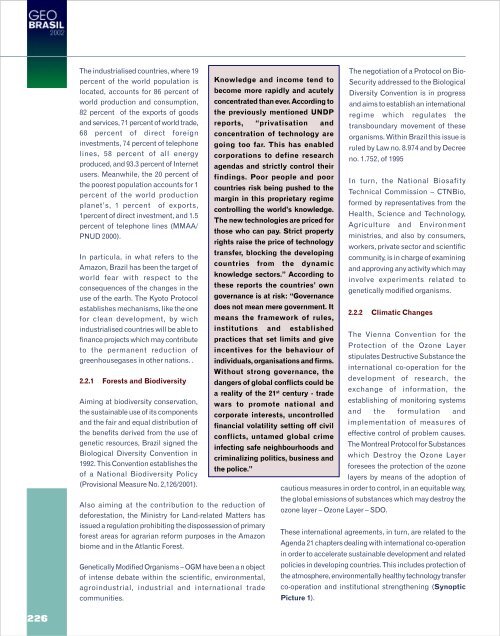GEO Brasil - UNEP
GEO Brasil - UNEP
GEO Brasil - UNEP
You also want an ePaper? Increase the reach of your titles
YUMPU automatically turns print PDFs into web optimized ePapers that Google loves.
The industrialised countries, where 19<br />
percent of the world population is<br />
located, accounts for 86 percent of<br />
world production and consumption,<br />
82 percent of the exports of goods<br />
and services, 71 percent of world trade,<br />
68 percent of direct foreign<br />
investments, 74 percent of telephone<br />
lines, 58 percent of all energy<br />
produced, and 93.3 percent of Internet<br />
users. Meanwhile, the 20 percent of<br />
the poorest population accounts for 1<br />
percent of the world production<br />
planet’s, 1 percent of exports,<br />
1percent of direct investment, and 1.5<br />
percent of telephone lines (MMAA/<br />
PNUD 2000).<br />
In particula, in what refers to the<br />
Amazon, Brazil has been the target of<br />
world fear with respect to the<br />
consequences of the changes in the<br />
use of the earth. The Kyoto Protocol<br />
establishes mechanisms, like the one<br />
for clean development, by wich<br />
industrialised countries will be able to<br />
finance projects which may contribute<br />
to the permanent reduction of<br />
greenhousegases in other nations. .<br />
2.2.1 Forests and Biodiversity<br />
Aiming at biodiversity conservation,<br />
the sustainable use of its components<br />
and the fair and equal distribution of<br />
the benefits derived from the use of<br />
genetic resources, Brazil signed the<br />
Biological Diversity Convention in<br />
1992. This Convention establishes the<br />
of a National Biodiversity Policy<br />
(Provisional Measure No. 2,126/2001).<br />
Also aiming at the contribution to the reduction of<br />
deforestation, the Ministry for Land-related Matters has<br />
issued a regulation prohibiting the dispossession of primary<br />
forest areas for agrarian reform purposes in the Amazon<br />
biome and in the Atlantic Forest.<br />
Genetically Modified Organisms – OGM have been a n object<br />
of intense debate within the scientific, environmental,<br />
agroindustrial, industrial and international trade<br />
communities.<br />
Knowledge and income tend to<br />
become more rapidly and acutely<br />
concentrated than ever. According to<br />
the previously mentioned UNDP<br />
reports, “privatisation and<br />
concentration of technology are<br />
going too far. This has enabled<br />
corporations to define research<br />
agendas and strictly control their<br />
findings. Poor people and poor<br />
countries risk being pushed to the<br />
margin in this proprietary regime<br />
controlling the world’s knowledge.<br />
The new technologies are priced for<br />
those who can pay. Strict property<br />
rights raise the price of technology<br />
transfer, blocking the developing<br />
countries from the dynamic<br />
knowledge sectors.” According to<br />
these reports the countries’ own<br />
governance is at risk: “Governance<br />
does not mean mere government. It<br />
means the framework of rules,<br />
The negotiation of a Protocol on Bio-<br />
Security addressed to the Biological<br />
Diversity Convention is in progress<br />
and aims to establish an international<br />
regime which regulates the<br />
transboundary movement of these<br />
organisms. Within Brazil this issue is<br />
ruled by Law no. 8.974 and by Decree<br />
no. 1.752, of 1995<br />
In turn, the National Biosafity<br />
Technical Commission – CTNBio,<br />
formed by representatives from the<br />
Health, Science and Technology,<br />
Agriculture and Environment<br />
ministries, and also by consumers,<br />
workers, private sector and scientific<br />
community, is in charge of examining<br />
and approving any activity which may<br />
involve experiments related to<br />
genetically modified organisms.<br />
2.2.2 Climatic Changes<br />
institutions and established<br />
The Vienna Convention for the<br />
practices that set limits and give<br />
Protection of the Ozone Layer<br />
incentives for the behaviour of<br />
stipulates Destructive Substance the<br />
individuals, organisations and firms.<br />
international co-operation for the<br />
Without strong governance, the<br />
development of research, the<br />
dangers of global conflicts could be<br />
exchange of information, the<br />
a reality of the 21 st century - trade<br />
establishing of monitoring systems<br />
wars to promote national and<br />
corporate interests, uncontrolled<br />
and the formulation and<br />
financial volatility setting off civil<br />
conflicts, untamed global crime<br />
infecting safe neighbourhoods and<br />
criminalizing politics, business and<br />
the police.”<br />
implementation of measures of<br />
effective control of problem causes.<br />
The Montreal Protocol for Substances<br />
which Destroy the Ozone Layer<br />
foresees the protection of the ozone<br />
layers by means of the adoption of<br />
cautious measures in order to control, in an equitable way,<br />
the global emissions of substances which may destroy the<br />
ozone layer – Ozone Layer – SDO.<br />
These international agreements, in turn, are related to the<br />
Agenda 21 chapters dealing with international co-operation<br />
in order to accelerate sustainable development and related<br />
policies in developing countries. This includes protection of<br />
the atmosphere, environmentally healthy technology transfer<br />
co-operation and institutional strengthening (Synoptic<br />
Picture 1).<br />
226
















